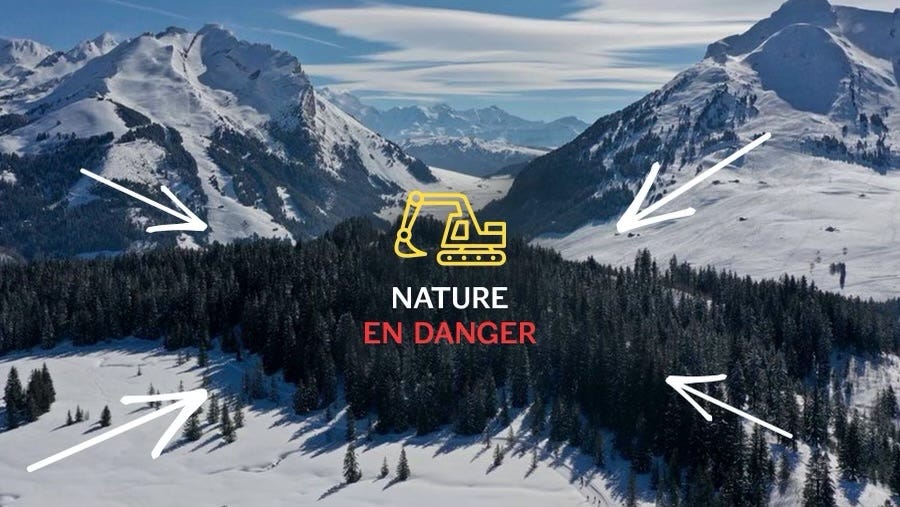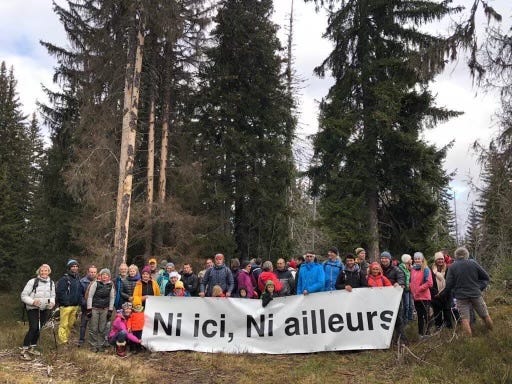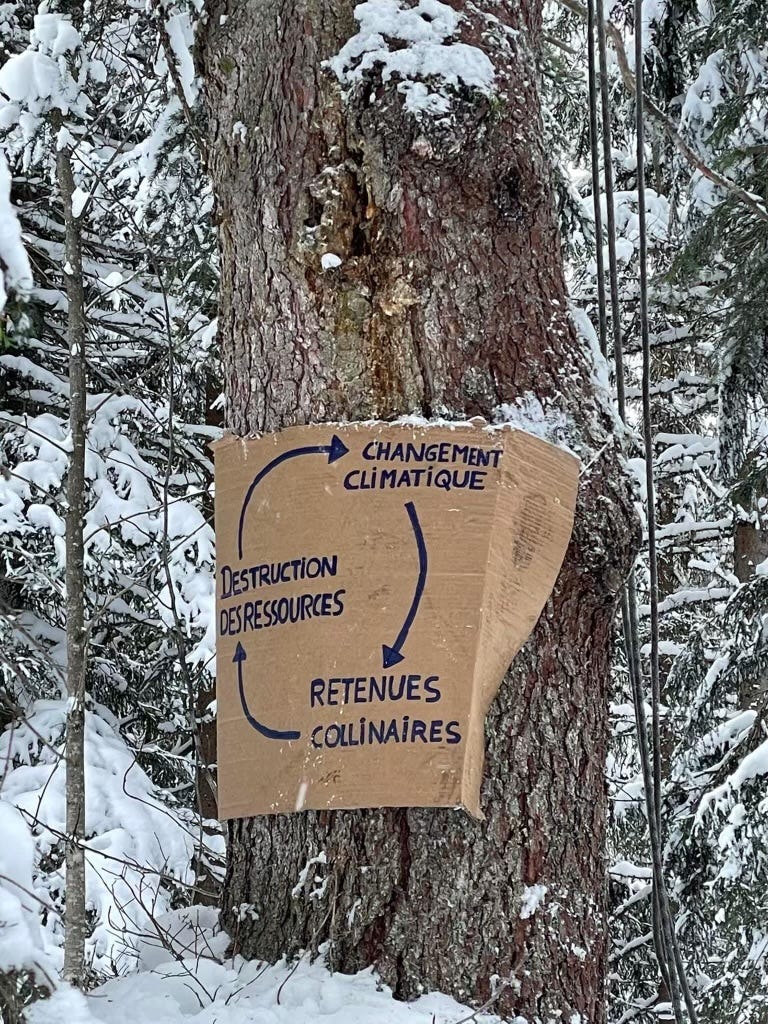“There is no new model, it’s an empty page.”
An interview with environmental activist Valerie Paumier of Resilience Montagne, who lives in the French Alps
“It’s difficult when we go to mountain villages and ask local people to change. They say: “What is the new economy? What is your new model?” There is no new model, it’s an empty page. There are no books with a new economy for the ski resorts or mountain villages, and people are of course frightened, but the longer we wait the harder it’s going to be.”
I first became aware of the work of Resilience Montagne in the French Alps last winter when there were protests against the building of a new reservoir for snowmaking in a forest above the ski resort of La Clusaz. The forest and its neighbouring peat bog are ecologically important wildlife havens, home to 48 different species, while La Clusaz already has four reservoirs for snowmaking.
And when I interviewed Vanessa Beucher from La Grave back in September, she also mentioned Resilience Montagne and suggested I speak to its founder Valerie Paumier. We had a really interesting conversation about her former career selling the French Alps to Asia, the future of low-lying ski resorts and how emotive the issue of snowmaking is, to the extent that she’s received death threats for speaking out against it. I hope you enjoy this chat.
Hey Valerie, I’m talking to you from your home in Annecy on a worryingly mild October day, so I won’t ask how the snow is…
The weather has been crazy. It’s been zero degrees at 4,000m, and even at night the glaciers have been melting.
How long have you been worried about the effects of global heating on the mountains?
I used to live in Hong Kong and my job was on the other side, to increase tourism to the Alps especially for people from Southeast Asia. I’d seen some reports, but I didn’t have the curiosity to properly look at what it meant. I moved back to Annecy and was working in finance in Geneva.
Then in 2016, I heard a conference about the climate crisis and global heating, and I thought: “Wow, this is so dangerous and important, what shall I do?” First of all, I thought I should stop working in business because it is not very ethical. And then I thought I should try to inform people about what it is happening with the mountains and climate.
I created Resilience Montagne and I said to myself that I had to tell the mountain industry, and the ski resorts, what they should do. I didn’t know they were not ready to do it, and they are still not ready, but I go on.
Was it hostility or were people simply putting their heads in the sand?
People didn’t understand why I changed my pitch so much, how I was doing the complete opposite to what I was doing before. But today I’m not really an exception, because a lot of people are now feeling the same way.
Do you think ski resorts have changed their response in recent years as it’s all become more evident?
It’s difficult because the political and economic governance doesn’t change, and the politics pushes the ski resorts and mountain villages to support the model. “If you still want snow, we can help you to produce it…” there is a lot of public money spent to support this model of [plentiful] snow.
Could you talk about what’s been happening in La Clusaz?
What is happening in La Clusaz is really an example of what is happening everywhere at this altitude. In order to produce snow, you need water, energy, and low temperatures.
Because we don’t have that much water, they want to create a reservoir to provide water for the artificial snow. To fill it they’ll pump from the springs and the river, which risks drying out the river, and they want to put this reservoir in La Clusaz in the middle of a huge forest.
It’s more than eight hectares and for what? To destroy the forest, which is home to 48 species, and make a huge building site everywhere. So, they can have 40% coverage through artificial snow and say they are still competitive in the snow industry.
It’s crazy because the spring brings tap water to La Clusaz, and if you dry out the rivers, you kill off all the biodiversity and fish and ecosystem and you influence the water cycles from up in the mountains to down in the valleys. We know we don’t have enough water in the valley already.
In the Haute Savoie we are now in a drought alert. There is a little town, not far from Annecy, which has been like that since last spring and the mayor decided in early summer that he will not allow any new buildings in the town anymore because he has no more water.
Here in Annecy, the lake has been so low, we have new beaches around, it’s changing visibly. The whole system is under a lot of pressure.
Are lots of resorts building reservoirs?
Yes, there are already so many, and they are building a lot, as a strategy for the region. They want to build 200 reservoirs in the next few years so all the resorts can make snow.
The protest in La Clusaz began two-three years ago. We had a petition with over 60k signatures, and a public poll where 76% of the local population said they didn’t want the reservoir. But the mayor said people want it and now people are not allowed to speak about it.
What do you mean not allowed to speak about it?
Every time you speak to someone in the village about it, they are very frightened. I’ve received death threats for speaking about this. I was in a restaurant, and somebody was very aggressive with me. Another day we were in the forest with a journalist speaking about this and we crossed a women with a dog from La Clusaz and she said: “Oh you are the people who are fighting about this, thank you so much,” but she wouldn’t speak the journalist as when she’s spoken up before, people started confronting her children in school about it.
At the beginning, a ski instructor said he wanted to help, and he was speaking a lot about it but then people told him if he was against the reservoir, he wouldn’t have any more pupils during the winter. It's like an omerta, it’s very aggressive.
At the moment the decision on whether to build or not is paused but it’s going to be a long judgement. In order to have the Olympic games in 2030 [which France is likely to bid for] we need snow and we don’t have snow because La Clusaz is not very high.
What should the model for lower altitude ski resorts be?
These ski resorts are really vulnerable to the climate crisis and it’s very sad. But we know we won’t have snow anymore and that energy is going to be too expensive. If you have to cover the resort with artificial snow then you have to increase the cost of the lift pass to pay for it.
Only 7% of the French ski, so when you increase your prices, you lose your very near target and have to find guests from further away such as the British or Asia, with people flying in a long way. There is a Club Med in a nearby resort and in January it is 80% full of Brazilian guests. It’s not the solution.
Is the answer, in your view, to move beyond ski tourism?
Yes, we should try to install real life in mountain villages that isn’t dependent on tourism and the ski industry. It was good for the past 60 years, thank you that we had this, thank you for everything, I’ve skied all my life, been a ski teacher, and I love it, but we can’t do it anymore.
In the mountains, when we see white, we have to think of the consequences of snowmaking. Maybe it’s cool and fun to ski but when there is no snow just enjoy a nice week in the mountains. And the marketing should reflect that and not just sell skiing.
It’s difficult when we go to mountain villages and ask local people to change. They say: “What is the new economy? What is your new model?” There is no new model, it’s an empty page. There are no books with a new economy for the ski resorts or mountain villages, and people are of course frightened, but the longer we wait the harder it’s going to be.
Is it hard to work on this stuff all the time?
Actually, I’m much happier than before because I’m in line with what I think. I had a lot of eco anxiety, and because I’m trying to do something, I think it helps me. Everybody loves the mountains, and everybody is surprised with what is happening and it helps a lot actually.
Read more about Valerie’s work with Resilience Montagne here
Here’s a piece I did for Huck which discusses some of these same issues in an Italian context (though good to see the new Olympic bobsleigh track might not be going ahead) and a piece for Mpora on ski resorts vs the climate crisis.
Other news:
I was very happy to win best ‘Sustainability Travel Feature of the Year’ last week (joint with Phoebe Smith) at the Travel Media Awards. Sustainability is obviously quite a loaded and problematic term but what I liked about this piece, and what I like generally about writing for Guardian Travel, is you don’t have to pretend the climate crisis doesn’t exist and that travel in 2023 isn’t problematic. They actively want you to wrestle with those thoughts in your articles, which makes the pieces better and suits me as I think about this stuff all the time.
This development threat to Iceland’s most famous point break looks worrying for the country’s surfers.
And finally, it was great to see the mighty Jeremy Jones, who I once interviewed for this piece, doing a q & a for
this week. He gave a rad answer to my question on parenting in a climate crisis and engaged in a good discussion with former newsletter interviewee Calum Macintyre of Just Stop Oil Norway about whether Protect Our Winters were right to drag FIS over their dredging of a glacier to hold an early season race. You can read the full thread here.Please fwd this newsletter to anyone who you think might be interested & if you have any story tips on any of these themes pls get in touch.







